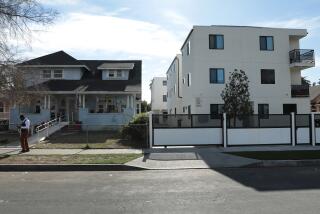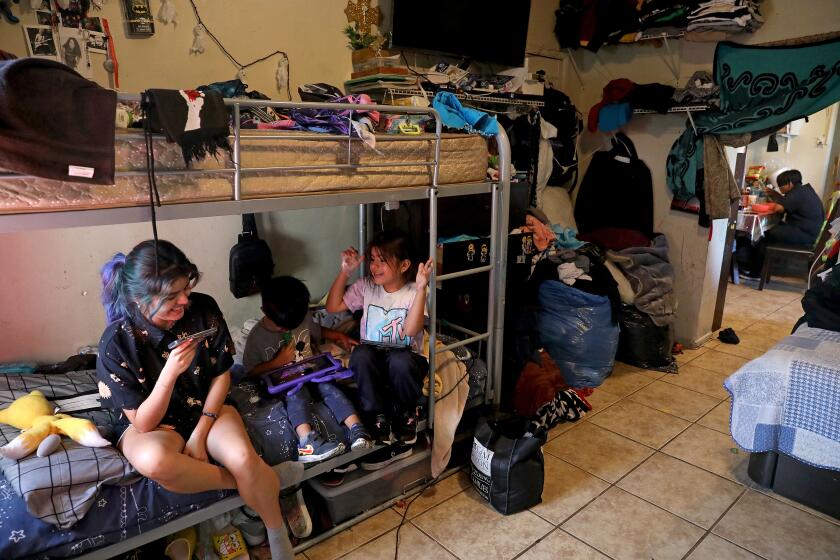FHA is urged to reform loan sale program
A program designed to help prop up the Federal Housing Administration is short-changing borrowers and neighborhoods hard-hit by foreclosures, community groups said as they took to the streets to push for changes.
Demonstrators in downtown Los Angeles and 10 other cities Tuesday urged federal regulators to reform an arcane 2-year-old program that bundles government-insured loans near foreclosure and auctions them off to the highest bidder.
The FHA has sold nearly 100,000 of these troubled mortgages since 2012, nearly all to hedge funds, private equity firms and other big Wall Street-type investors looking to profit from collecting mortgage payments or foreclosing the houses and then selling or renting them.
So far, the program has pumped nearly $9 billion into the beleaguered coffers of the FHA, which insures a big chunk of the nation’s mortgage market. But critics say the sales do too little to protect people and places that are wrestling with the aftermath of the foreclosure crisis.
“We think they should stop sales of these loans until they fix the program,” said Amy Schur, campaign director at Alliance of Californians for Community Empowerment, which helped organize about 30 protesters at the U.S. Department of Housing and Urban Development’s office in downtown Los Angeles on Tuesday. “They need to prioritize purchasers that have outcomes that preserve homeownership and create affordable housing in these neighborhoods.”
The protests over the Distressed Asset Stabilization Program are the latest ripple in the wake of the foreclosure crisis, which has seen growing concern about the “Wall Street-ization” of the housing market.
A handful of large real estate trusts and investment firms have scooped up an estimated 200,000 bargain-rate houses in the last two years — in some cases elbowing first-time home buyers out of the way — and turned them into rental properties.
Some of these firms are now buying the loans, getting potential rental properties even before they are in foreclosure. Other buyers aim to profit by collecting mortgage payments or by selling the homes after they foreclose.
From the FHA’s perspective, the program is working, said Carol Galante, the agency’s commissioner.
“We really do consider the DASP to be quite successful in accomplishing what it set out to do,” she said. “That was to achieve significant cost savings for [the FHA] and at the same time offer borrowers a final opportunity to avoid foreclosure.”
Many of the loans that are being sold haven’t had payments on them in two or three years, Galante notes, and they’ve run out of options for being reworked by the FHA. But a new owner may be able to restructure them or reduce principle payments to help borrowers, she said.
Of the 38,000 loans that had been sold before July 2013, about half are still being worked out, according to data released last week by HUD. In about 5% of cases, borrowers are back on schedule making payments. Most of the rest ended either in a foreclosure or short sale or were flipped to another investor and are no longer being tracked.
The program has some successes, said Sarah Edelman, a policy analyst at the Center for American Progress.
About one-fifth of the loans are in “neighborhood stabilization” loan pools, which are geographically concentrated and carry higher workout requirements. Nearly 24% of them are being paid on time. And among the relatively small slice that were sold to nonprofit lenders that partner with community housing groups, the success rate tops 35%.
“This program shows a lot of potential,” Edelman said. “FHA really has an opportunity to build on its strengths.”
The trouble is that only about one-fifth of the loans have been packaged in those neighborhood pools. And even when they are, nonprofit lenders often get outbid. That’s what happened to National Community Capital this summer when it tried to buy a pool of 118 loans in San Bernardino.
The firm, an arm of nonprofit lender New Jersey Community Capital, which has successfully reworked nearly 40% of loan pools it bought in 2012, has found it harder to compete as the market to buy these loans has heated up, said Chief Executive Scott Fergus. Those higher prices are good for the FHA’s bottom line, he agrees, but maybe not for borrowers and their communities.
“As a taxpayer, I think HUD’s been doing a good job,” he said. “As an organization that believes modifying loans and keeping people in their homes is the best outcome, it’s more complicated.”
In some cases, Fergus and other market watchers note, big investors are just as interested in helping borrowers stay in their homes since monthly mortgage payments can make a nice income stream. In others, though, the investors aim to flip their portfolio for a quick profit, foreclose and sell the houses, or convert them into rentals.
The two largest buyers of these distressed loans — Dallas-based private equity firm Lone Star Funds and Bayview Asset Management, which is owned in part by Blackstone Group, the biggest player in the single-family rental business — have said little about their long-term plans. Bayview didn’t return calls, and a Lone Star spokesman declined to comment.
Galante said HUD plans to tweak the program — creating some smaller pools, putting more loans in the neighborhood program with its tougher guidelines, and giving potential buyers more time to perform due diligence and raise cash. These changes, she said, should help community lenders compete. They’ll be in place by an auction scheduled for November.
Whatever system the FHA devises could have a wider effect, Edelman said. Although the agency has sold about 100,000 delinquent loans, it still has roughly 500,000 on its books. Its cousins Fannie Mae and Freddie Mac have even more in their portfolios, and are launching similar loan-sales programs.
“It’s fairly early in the days of this program,” Edelman said. “There’s really an opportunity to create a system that works for everybody.”







